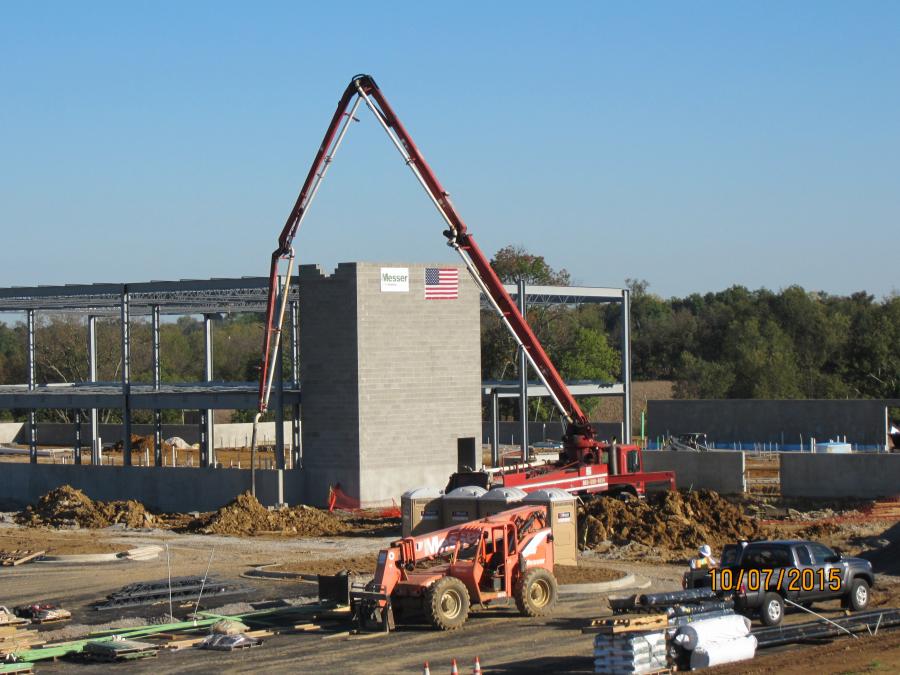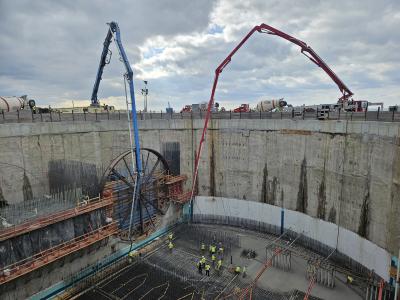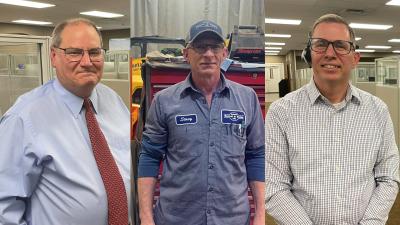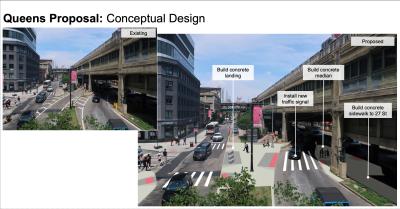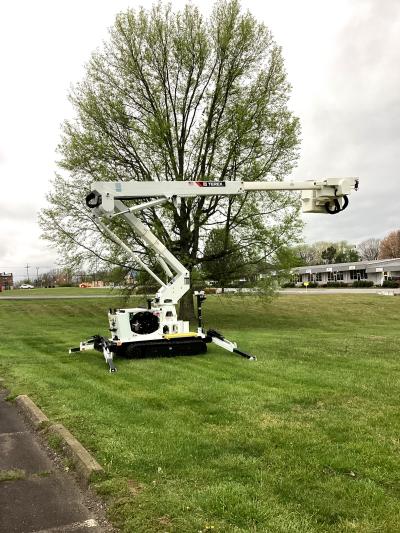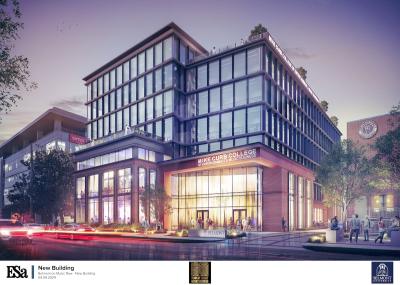Bluegrass Community and? Technical College photo. The new facility, located just outside Lexington, will accommodate 1,200 students, along with 12 full-time and 20 part-time faculty.
Envisioned a decade ago through a partnership between Bluegrass Community and Technical College (BCTC) and Toyota Motor Manufacturing Kentucky, a $24 million Advanced Manufacturing Center in Georgetown, Ky., is nearing completion. The new facility, located just outside Lexington, will accommodate 1,200 students, along with 12 full-time and 20 part-time faculty.
"Many of our manufacturers in the area have expressed a need for multi-skilled maintenance employees, both currently and in the future," said Mark Manuel, BCTC vice president of advancement and organizational development. "As they forecast their workforce needs, they know many of their current workers are baby boomers, and will retire in large numbers in the coming years. In addition to expanding the number of students in this unique work and learn program, it provides a learning environment that mirrors the environment they will apply their newly learned skills to – a production manufacturing facility."
The building is situated on a 20-acre site of donated land in Lanes Run Business Park. Convenient to the interstate and centrally located to many of the manufacturers in central Kentucky, the Center will provide a permanent home to the Advanced Manufacturing Technician program currently being housed on site at Toyota.
Construction began in the spring of 2016. The capital project is bonded by the Commonwealth of Kentucky, and will be completed by January 2017. It's taken years, however, to bring it to fruition.
"The building was designed in 2007, but with the economic recession, there was no funding to complete it. With a resurgence in the economy, and local manufacturing expansions, such as Toyota beginning to produce Lexus in Kentucky, it's become a reality," said Manuel.
Manuel said BCTC has partnered with Toyota Motor Manufacturing Kentucky since they opened in 1987.
"That relationship has changed and grown as both of our organizations have grown and needs have changed. It has blossomed into a true partnership, not just a client/customer relationship."
The Advanced Manufacturing Technician (AMT) program is credited with producing many experienced technicians, according to Manuel.
"The programs allows students to go to school all day, two days a week. The other three days per week they work at their sponsoring company, applying the skills and concepts they have learned in the classroom. Because they are paid, they can complete the program free of debt.
"The program lasts two-and-a-half years, and runs through the summers, as well. The graduates score higher in skilled trade assessments than the experienced maintenance workers being hired off the street, which is a testament to the structure of the program and the dedication of those involved," said Manuel.
Louisville, Ky., based Messer Construction Co. is serving as the general contractor on the project. Joey Summers, Messer Construction senior project manager, said the property was an open field prior to construction, however the site required a fair amount of grading and rock blasting/removal, which took three weeks.
"Grading took about six weeks," said Summers.
Right now crews are working on finishes and making the final push to completion. Workers have already completed the basic structure, roof, exterior skin, drywall and MEP rough in. Key tasks yet to be carried out include flooring, finish painting, casework and lighting.
The work required to build the classrooms and administrative offices was fairly routine, while construction of the computer labs did involve additional data ports.
"This space is very open and unique, although standard construction practices still applied," said Summers. "Having the large open space definitely helps in the respect that it allows plenty of room for trades to work around each other."
Summers said the elements also have played a role during construction.
Main equipment required on the job includes dozers, scrapers, aerial lifts and excavators. Materials used have included structural steel, concrete, exterior metal panels and glazing.
The Advanced Manufacturing Center will provide many of BCTC's manufacturing-related programs. Programming will include electronics, industrial maintenance, PLCs, industrial electricity, robotics, mechanical drives, fluid power, welding and machining. Customized workforce training for business development also will be offered, along with traditional general education courses to support residents from Georgetown / Scott County and surrounding communities.
"The electronics, robotics, and welding really don't change our mindset of how we build," said Summers. "We build to the plans and specs which account for these items."
According to Michael Jacobs, AIA, CID, LEED AP, president, Omni Architects and Jeff Bennett, senior associate, AIA, LEED AP, it was important for the building to function effectively as a regional manufacturing teaching and training facility.
"We felt the aesthetic and materials used in the building should reflect manufacturing and technology," said Bennett. "We accentuated many of the structural elements, so they were expressed as very visible and refined parts of the building.
Bennett said one of the largest challenges was to provide spaces for both manufacturing training and classroom spaces.
Unlike traditional community college campuses, the center was designed to mimic a manufacturing production facility. Along with classrooms, computer labs and administrative offices, most of the 78,000 sq. ft. (7,246 sq m) will be a flexible high bay space.
"We visited Toyota and other regional manufacturing facilities," said Bennett. We emulated actual factory spaces by using high-bay ceilings. Each training discipline has a dedicated area, but they are not physically separated by walls."
"The manufacturing floor is one level and the classroom component is two levels. The atrium allows for visual connectivity to both floors. The primary cladding of the building is an insulated metallic metal panel. Just at ground level, we have architectural exposed concrete. This gives the perimeter of the building durability for maintenance.
Bennett also said it was important for the design to complement the surrounding area. Sustainability also had to be addressed during the design process.
"We chose materials that were very energy-efficient. The wall panels are an high-insulated core metal panel. The roof is a 'cool roof,' which reflects sunlight and prevents heat gain. The windows are a low emissivity glazing that prevents heat gain. All the lighting is highly efficient LED lighting. All these systems come at a premium to construct, but save the user on energy costs for years to come. We are currently working with BCTC on a solar PV collector array, and a wind turbine that will be a part of the educational training at the BCTC Georgetown campus," Bennett said.
"We have worked on three AMC type projects with the Kentucky Community and Technical College System. It's been a pleasure to take part in these projects. We fully believe in the mission to provide this vital training to the regional workforce for this growing manufacturing sector."
The Commonwealth of Kentucky, through the Kentucky Community and Technical College System, was among the first to adopt the Advanced Manufacturing Center teaching methodology offering educational opportunities through degrees, certificates and workforce training, resulting in more opportunities for those taking part.
Bennett said, "We at Omni Architects are proud to have been involved with these efforts, and to search for innovative ways to express architectural design in order to promote these projects as more than just a container for a program, but rather a place where people want to come and experience new opportunities and build strong relationships with their colleagues."
Today's top stories



